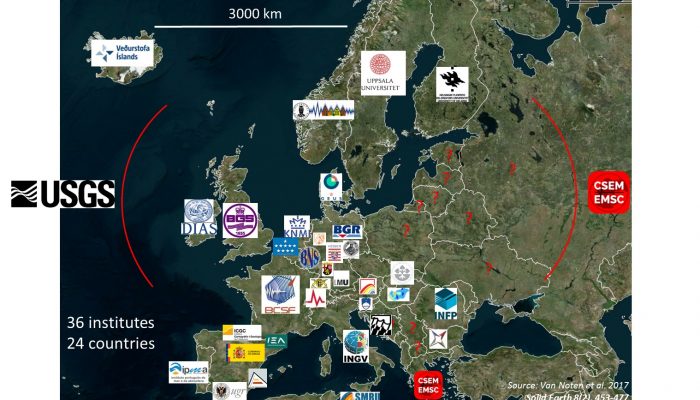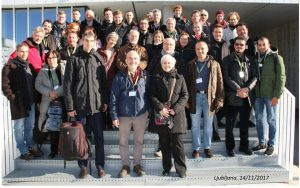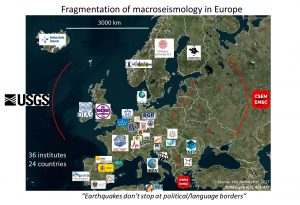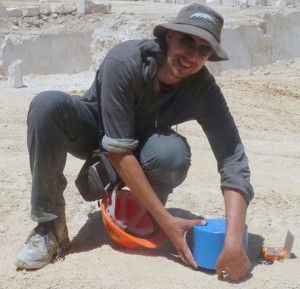
“Did you feel the earthquake ?” “Avez-vous ressenti un tremblement de Terre?” “Erdbeben gespürt?”
” Følte du siste jordskjelv?” “Sentiu um Sismo?”
“Ha sentido algún terremoto?” “Pocítili ste zemetrasenie?” “Hai Sentito il Terremoto?”
“почувствахте ли земетресение?”
Technical workshop on internet macroseismology: a reflection
14-15 November 2017, Ljubljana, Slovenia
Last week 41 European seismologists from 19 organisations gathered at ARSO in Ljubljana (Slovenia) to discuss on a solution how macroseismic data, i.e. earthquake intensity data derived from felt earthquake reports, could be better collected and exchanged between seismological institutes in the future. The European and Mediterranean situation is quite complex as at least 36 seismological institutes (see below) in 24 countries all collect felt reports using their own or a standardised online questionnaire or using a smartphone app. When an earthquake is only felt within the border of one country, likely only one responsible national institute (except in Germany or Spain) will have all the data and can properly map the earthquake impact. However, in case of cross-border felt earthquakes, the gathering of macroseismic data is fragmented between different institutes who are all responsible for the macroseismic information in their country. Hence, sharing intensity values derived from online questionnaires is essential and would strongly facilitate mapping the impact of transfrontier-felt earthquakes in the future.
During the workshop 17 studies (see list) on national and international methodologies, objectives, collecting systems and case studies were presented. Currently, apart from rapid information about the felt area from EMSC and a few cross-border initiatives, there is no coordinated and comprehensive system to collect, interpret and present macroseismic data on a European level. During the discussion numerous ideas were exchanged how to harmonise the data to facilitate the exchange. It was decided to develop a new proposal for an ESC (European Seismological Commission) working group that can concentrate on these challenges in macroseismic data exchange in Europe, and to propose a special session dedicated to Internet Macroseismology at the forthcoming ESC General Assembly in Malta (2-7 Sep 2018).
The workshop was organised by Ina Cecić (ARSO) and Rémy Bossu (EMSC) with the support from EPOS.
Let’s give macroseismology in Europe a face. Earthquakes don’t stop at political or language borders.
 Participants to the workshop. Source: ARSO: http://www.arso.gov.si/o%20agenciji/novice/arhiv (14 Nov 2017)
Participants to the workshop. Source: ARSO: http://www.arso.gov.si/o%20agenciji/novice/arhiv (14 Nov 2017)
Following studies were presented:
- Bossu R. (EMSC) Collecting felt reports of Global Earthquakes at EMSC: How and Why?
- Landes M. (EMSC) From eyewitnesses to seismological services.
- Šket Motnikar B. & Cerk M. (ARSO, IZV, Slovenia) Overview of database structure and macroseismic assessment through web application in Slovenia.
- De Rubeis, V. & Tosi, P. (INGV, Italy) The experience of crowdsourced web macroseismic intensity investigation in Italy: evolution, results, problems and perspectives.
- Pazak P. (ESI SAS, Slovakia) Slovak web-based questionnaire for macroseismic data collection.
- Rønnevik C. (UniB, Norway) Integration of Norwegian Macroseismic Data into EPOS e-Infrastructure.
- Schlupp A. & Sira C. (BCSF EOST, France) BCSF macroseismic data collection for French territories, and their exchange and merging for earthquakes affecting different countries.
- Horn N. (ZAMG, Austria) Webservices for the distribution of macroseismic data.
- Sović I. & Ivančić I. (GO PMF, Croatia) Macroseismic data collected in Croatia by internet.
- Kaiser D. (BGR, Germany) Collecting macroseismic data in Germany by internet – an overview.
- Musson R. (by Cecić I.) (BGS, UK) Implementing the EMS for online intensity.
- Moldovan I.A. (NIEP, Romania) Internet macroseismology in Romania.
- Alves P.M. & Marreiros, C. (IPMA, Portugal) Overview of the methods and results related with macroseismic web-questionnaires at IPMA – Portugal
- Sbarra P. (INGV, Italy) Macroseismic diagnostics anomalies some practical examples.
- Beinersdorf S. (BUniW, Germany) Shakemaps for Central Europe implementing macroseismic observations
- Van Noten K. & Lecocq T. (ROB, GSB, Belgium) Merging transfrontier internet macroseismic data of earthquakes in NW Europe using a grid cell approach
- Batlló J., Jara J.A., Irizarry J. & Figueras S. (ICGC) Macroseismics in Cataloni
European institutes
In below an overview is given of all European institutes that organise a macroseismic online survey (or in their overseas departments). Apologies if any survey would have been forgotten. Please contact us for mistakes. This list is constructed to give Macroseismology more visibility and to create some transparency in this labyrinth of data collection.
 Source: Solid Earth 8(2)
Source: Solid Earth 8(2)
Andorra: CENMA, Unit for Environmental studies: Enquesta Sísmica (Catalan)
Austria: Zentralanstalt für Meteorologie und Geodynamik (ZAMG): Erdbeben gespürt?
Belgium – Germany: Transfrontier collaboration between the Royal Observatory of Belgium and the University of Cologne (Erdbebenstation Bensberg): Avez-vous ressenti un tremblement de Terre? / Heeft u de aardbeving gevoeld? / Haben Sie ein Erdbeben gespürt / Did you Feel the earthquake?
Bulgary: National institute in Geophysics, Geodesy and Geography: ВЪПРОСНИК ЗА УСЕТЕНО ЗЕМЕТРЕСЕНИЕ
Czech Republic: Uses the international EMSC inquiry. I just felt an earthquake
Denmark: Geological survey of Denmark and Greenland: Indberetning af jordskælv
Finland: University of Helsinki : Ilmoitus maanjäristyshavainnoista (Finnish) / Skicka Din rapport om jordskalvet (Swedish)
France: Le Bureau Central Sismologique Français (BCSF) : Avez-vous ressenti un tremblement de Terre?
Germany:
- Geologischer Dienst NRW (Krefeld): Erdbebenmeldeformular
- Landeserdbebendienst Baden-Württemberg (Freiburg): Erdbeben – Mitteilung
- Hessisches Landesamt für Umwelt und Geologie (Hessen): Erdbeben gefühlt?
- Nierdersächsischer Erdbebendienst BGR (Hannover): Erdbeben-Fragebogen
- Landesamt für Geologie und Bergbau (Rheinland-Pfalz – Saarland): Erdbeben Befragung
- Ludwig-Maximilians-Universität München (Bayern): Erdbeben gefühlt?
- Geophysikalischen Observatorium Collm (Uni. Leipzig). Fragebogen zu den auswikungen des erdbebens
- Universität Jena (Thüringen – Vogtland): Erdbeben gespürt?
Greece: Uses the international EMSC inquiry. I just felt an earthquake
Hungary: Hungary Earthquake Information System: Amennyiben Ön is érezte a földrengést, kérjük töltse ki kérdőívünket!
Iceland: Icelandic Met Office : Tilkynna jarðskjálfta
Ireland: Dublin Institute for advanced sciences: Have you felt an earthquake
Italy: Istituto Nazionale di Geofisica e Vulcanologia (INGV): Hai Sentito il Terremoto?
Malta: University of Malta: Did you feel an earthquake?
Norway: Norwegian National Seismic Network – University of Bergen: Følte du siste jordskjelv?
Portugal: Instituto Português do mar e da atmosfera: Sentiu um Sismo?
Romania: National Institute for Earth Physics : L-ai simtit?
Slovakia: Bratislava Geophysical Institute: Pocítili ste zemetrasenie na Slovensku?
Slovenia: Slovenian Environment Agency : Potresi – vprašalnik
Spain:
- Instituto Geográfica Nacional: Ha sentido algún terremoto?
- Cartographic Institute of Catalonia: Ha sentido algún terremoto? (Spanish) – Heu percebut un terratrèmol? (Catalonian)
- Granada University: Ha sentido algún terremoto?
- University of Alicante: Ha sentido un terremoto?
Switzerland: Swiss Seismological Service: “Did You Feel an earthquake?” (also available in French, German, English and Italian)
Sweden: Svenska nationella seismiska nätet – Uppsala Universitet: Har du känt av ett jordskalv?
The Netherlands: Koninklijk Nederlands Meteorologisch Instituut (KNMI): Heeft u een aardbeving gevoeld?
United Kingdom: British Geological Survey (BGS): Have you felt an earthquake?
Global: European–Mediterranean Seismological Centre (EMSC): Have you felt an earthquake?
By Koen Van Noten
Koen Van Noten is an earthquake geologist at the Geological Survey of Belgium (previously Royal Observatory of Belgium). He investigates the influence of site effects on intraplate earthquake ground motions using intensity data of felt earthquakes and near-surface geophysical techniques. Koen’s role as ECS is to encourage students to promote their results in seismology, geology and near-surface geophysics in various ways.


